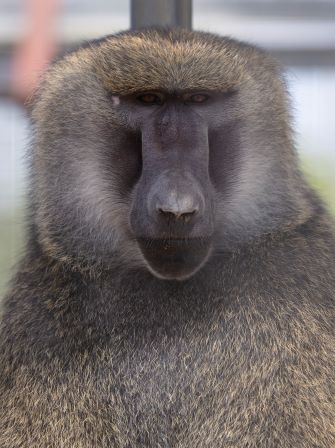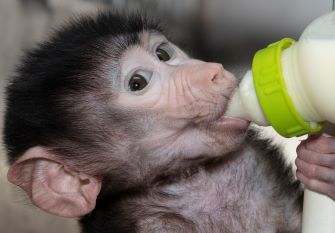Specific-Pathogen-Free Baboon Research Resource
Grant Number: P40OD024628
Research Emphasis/Objectives
The main objectives of the Specific-Pathogen-Free Baboon Research Resource (SPFBRR) are to conduct applied research to improve the resource, support investigators who need facilities and expertise for research projects involving olive baboons that are free of all known adventitious viruses of baboons, and expand the resource to create a self-sustaining SPF breeding colony of behaviorally healthy and genetically robust breeding animals.
Current Research
Adventitious virus-free baboons are used primarily in infectious disease research, including studies of respiratory syncytial virus (RSV), pertussis (whooping cough), and bacterial sepsis. Additionally, virus-free baboons are used to support xenotransplantation research. Virus-free baboons also are used to study the pathogenesis of herpesvirus and retrovirus infections in their native hosts. Because baboons have a more complete immune system than macaques and other commonly used research nonhuman primates (NHPs), animals from our colony also have been used extensively to support vaccine development studies, including novel human vaccines for COVID-19.
Services Provided
To Outside Investigators
Tissues and biologics are available. Specimens are provided on a priority basis to NIH-sponsored research studies. Prices are available upon request.
To Collaborating Scientists
Individuals interested in collaborative studies should contact the principal investigator and provide a study outline. Approval of collaborative projects depends on the relevance of the proposed project to the objectives of the ongoing research effort. Complete animal husbandry, medical care, and pathology services are available without charge to investigators who have received approval from the principal investigator to use resource colony animals.
Animal Resources
The SPFBRR is the only national research resource of olive baboons that is free of all known adventitious viruses of baboons available to NIH grantees; intramural research programs of federal agencies, including the U.S. Food and Drug Administration, National Science Foundation, and NIH; and other sponsors of biomedical research. Absolutely unique in the entire world, the baboons in the SPFBRR have an extensive bioexclusion list of 19 pathogens normally found in other wild and captive NHP colonies.
Contact Information
SPF Baboon Research Resource
The University of Texas MD Anderson Cancer Center
Michale E. Keeling Center for Comparative Medicine and Research
Department of Comparative Medicine
650 Cool Water Dr.
Bastrop, TX 78602
mdanderson.org/kccmr
Principal Investigator and Contact
Joe H. Simmons, D.V.M., Ph.D., DACLAM
Phone: 512-321-3991
Fax: 512-332-5208
[email protected]



